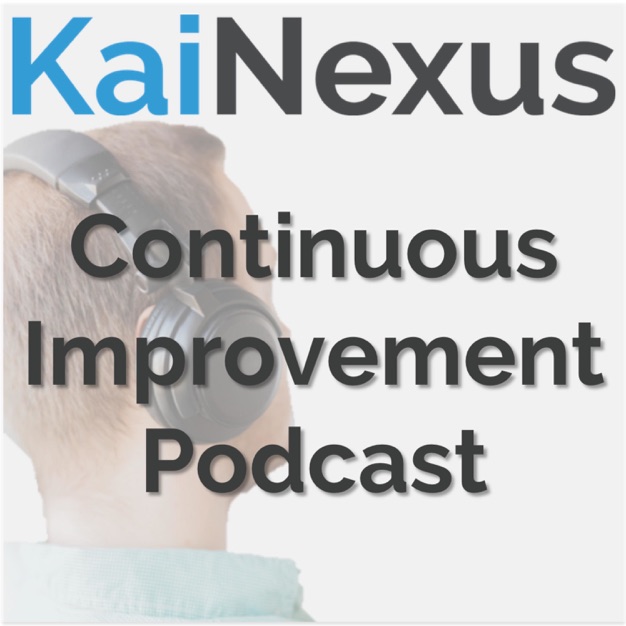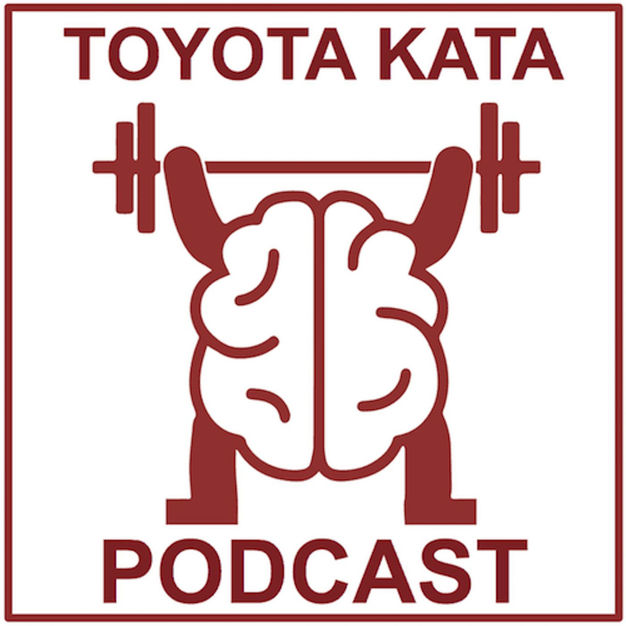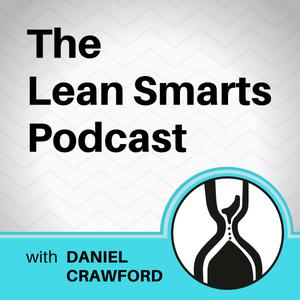
Lean Blog Audio
Mark Graban
Mark Graban reads and expands upon selected posts from LeanBlog.org. Topics include Lean principles and leadership in healthcare, manufacturing, business, and the world around us.
- 6 minutes 2 secondsSafety First: GE Aerospace’s Lynn Facility Demonstrates True Lean Leadership
At its core, Lean is about people–respecting them, empowering them, and ensuring their well-being while driving continuous improvement. Recently, GE Aerospace's Lynn, MA, facility provided an inspiring example of what it means to put these principles into action, even under challenging circumstances.
Read more about this and/or watch a video at this link:
Keep the Line Moving: GE Aerospace's Lynn Facility Is Using FLIGHT DECK to Put Safety First
21 January 2025, 1:12 pm - 2 minutes 37 secondsLeadership Gone Wrong: The Cost of Prioritizing a CEO’s Ego Over Effectiveness
A sad but true leadership tale:
“Unlike most CEOs who rely on their executive team to keep them informed, [redacted] relies on his team to keep him feeling good about himself.
And so whenever somebody would tell him something that he didn't know and make it very clear that he wasn't the smartest person in the room on each and every topic, he generally fired them.”
17 January 2025, 1:02 am - 11 minutes 39 secondsStarting the New Year with Global Leadership Resolutions: Building a Foundation of Psychological Safety
During Katie Anderson‘s #JapanStudyTrip this past November, a participant shared an observation with me that resonated deeply:
“The biggest challenge is our blame culture. It's easier for people to do nothing because they don't get in trouble.
But if they make a mistake, they get punished.
And our company is successful enough that there's not a compelling reason for top leaders to change the culture.”
This isn't a story from the U.S., but the feeling is universal.
A workplace culture where individuals are punished for mistakes–especially when those mistakes have systemic causes–is a significant barrier to progress.
It's a global challenge, and addressing it requires rethinking how we approach leadership and learning.
6 January 2025, 6:51 pm - 6 minutes 12 secondsLost My iPhone in Tokyo: A Lesson in Japanese Kindness and Culture on My Japan Study Trip
Read the blog post: https://www.leanblog.org/2024/11/lost-iphone-japan-taxi-tokyo-kindness-culture/
I'm thrilled to be back in Japan for the first time in five years. Today is the start of Katie Anderson's Japan Study Trip (learn more about joining her in May 2025). It's great to be here for another week of learning and great experiences.
Little did I know, I'd kick off the trip by nearly losing my iPhone on the streets of Tokyo–a mistake that ended up teaching me a valuable lesson about Japan's culture of trust.
10 December 2024, 9:49 am - 4 minutes 5 secondsTen Years Ago -- In the News Visiting a Japanese Lean Hospital
Just over a week ago, I got back from Katie Anderson's Japan Study Trip. It was amazing! I have so much to write about and share.
But first, Facebook reminded me of something from exactly ten years ago–the second time I visited Japan with the Kaizen Institute.
I asked 2024 ChatGPT to translate this 2014 news story that's pictured below (with me sitting there and taking notes in the front row of the meeting room). See the English text below the image:
5 December 2024, 9:39 am - 7 minutes 19 secondsSurveying the Lean Global Connection Audience on Barriers to Speaking Up
The blog post: https://www.leanblog.org/2024/11/surveying-the-lean-global-connection-audience-on-barriers-to-speaking-up/
At yesterday's Lean Global Connection event, I posed a straightforward yet revealing question to the audience:
“What keeps you from speaking up at work?”
The responses illustrated two of the common barriers. I posed the survey options based on the research of Prof. Ethan Burris, from the University of Texas at Austin, who has found that fear and futility are the top two reasons why people choose to stay quiet.
For some, fear stood in the way–the fear of reprisal, being judged, or being seen as a troublemaker.
For others, the obstacle wasn't fear but futility–the belief that speaking up wouldn't make a difference. Four people, sadly, said BOTH were barriers.
And yet, amidst these challenges, eight people shared that they felt no barriers at all, a testament to the environments they work in. That is the ideal we should all strive for.
The survey results line up with the Burris research that shows futility is actually the biggest reason, not fear.
3 December 2024, 1:33 pm - 7 minutes 56 secondsJust Call it “5S Six Sigma” Instead of “Lean Sigma” Please
My whole career, I have worked with the Lean methodology (aka the Toyota Production System).
I've just really never done much with Six Sigma. I've read about Six Sigma. I took a Green Belt course when I worked at Dell in the late 90s. I've studied and used statistical methods (especially what I learned in my Industrial Engineering studies and at MIT), but I've never done anything I would call Six Sigma in my career.
I have respect for Six Sigma as a discipline, just as if I were a chef, I would have respect for pastry chefs. They can co-exist in the kitchen. You might both use whisks, but you have slightly different training to do different things. These roles aren't interchangeable, and neither are Lean and Six Sigma. That's one reason I get riled up about so-called “Lean Sigma” or “Lean Six Sigma.”
Most of the “L.A.M.E.” (Lean As Mistakenly Explained) examples that I see on the interwebs come from “Lean Sigma” discussions, especially on LinkedIn.
What are the fallacies that are thrown around? They include, but are not limited to:
- Lean is about the average, Six Sigma is about the variation
- Lean is about internal processes, Six Sigma is customer-focused
- Lean is for efficiency; you need Six Sigma for quality (this one is the fault of Mike George and his books, many say)
- Lean and Six Sigma are just toolboxes, and you use whichever is appropriate for the problem at hand
These are all incorrect, as somebody with good Lean training or Lean experience would realize.
29 October 2024, 9:08 am - 7 minutes 19 secondsLean Failure Explained: When Command-and-Control Leadership Sabotages Success
How Often Does This Happen?
It's a story I've heard too many times. An organization spends years, even decades, entrenched in a top-down, command-and-control culture. In this environment, employees are micromanaged, decision-making is reserved for those at the top, and when things go wrong, the finger-pointing begins. “Blame and shame” becomes the norm.
Then, someone decides,
“We're going to get Lean.”
On the surface, this should be great news. Lean offers proven strategies to improve safety, quality, and employee engagement. But here's the catch: the organization doesn't change how it leads. It still clings to the same top-down mentality that has suffocated the workforce for years.
What follows might be described as a superficial Lean transformation. It's probably more of a “Lean effort” (or “Lean hope”) than any sort of transformation.
24 October 2024, 7:28 am - 17 minutes 42 secondsWhoa! A.I. Podcast Hosts Discuss “The Mistakes That Make Us”
I've played around with ChatGPT before (including in a few blog posts), but the advancements in A.I. technologies are pretty breathtaking.
I recently tried out the new “Notebook LM” tool from Google.
I uploaded a PDF of my latest book, The Mistakes That Make Us: Cultivating a Culture of Learning and Innovation, and it was able to generate a realistic-sounding podcast episode about the book. It's like an NPR podcast in tone and style. There's a male A.I. host and a female A.I. host bantering about the book as they recap some of the key points and themes.
It's not perfect — they pronounce my name wrong in a few different ways — but it's a fascinating experiment in how to take a really long document and summarize it in a consumable way.
They definitely didn't say everything exactly the way I would have stated it. However, the podcast seems to perfectly simulate the discussion that two people might have after both reading and enjoying the book.
21 October 2024, 8:13 pm - 9 minutes 26 secondsWhy Labeling Mistakes as 'Stupid' Is the Real Mistake: Turning Errors into Growth
When discussing mistakes, it's common to hear terms like “stupid mistake” or “dumb mistake” thrown around, especially when reflecting on our own errors.
However, labeling mistakes in this way is unproductive.
In The Mistakes That Make Us, one of the key ideas is that we shouldn't label mistakes as “stupid” or “dumb.” Mistakes are a natural part of the human experience, and even the smartest, most capable people make them.
9 October 2024, 8:38 am - 2 minutes 54 secondsLeadership Failure: How Refusing to Be Wrong Hurts Teams and Innovation
“I am never, ever wrong.”
That's a statement that should disqualify an applicant from ANY leadership position.
True leadership isn't about projecting infallibility–it's about fostering a culture where mistakes are seen as opportunities for learning and growth.
Leaders who claim they're never wrong create an environment where fear of failure stifles innovation, and team members are less likely to speak up or challenge ideas. This is the opposite of what effective leadership requires.7 October 2024, 6:04 pm - More Episodes? Get the App
Your feedback is valuable to us. Should you encounter any bugs, glitches, lack of functionality or other problems, please email us on [email protected] or join Moon.FM Telegram Group where you can talk directly to the dev team who are happy to answer any queries.
 KaiNexus Continuous Improvement Podcast
KaiNexus Continuous Improvement Podcast
 Toyota Kata Podcast
Toyota Kata Podcast
 Podcasts | Lean Healthcare Exchange
Podcasts | Lean Healthcare Exchange
 Lean Smarts Podcast: Lean Manufacturing | Leadership
Lean Smarts Podcast: Lean Manufacturing | Leadership
 WLEI - Lean Enterprise Institute's Podcast
WLEI - Lean Enterprise Institute's Podcast
 Lean Blog Interviews
Lean Blog Interviews